
Richard Colvin Reid, also known as the Shoe Bomber, is the perpetrator of the failed shoe bombing attempt on a transatlantic flight in 2001. Born to a father who was a career criminal, Reid converted to Islam as a young man in prison after years as a petty criminal. Later he became radicalized and went to Pakistan and Afghanistan, where he trained and became a member of al-Qaeda.
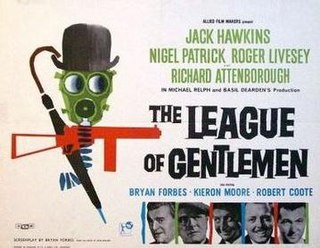
The League of Gentlemen is a 1960 British heist action comedy film directed by Basil Dearden and starring Jack Hawkins, Nigel Patrick, Roger Livesey and Richard Attenborough. It is based on John Boland's 1958 novel of the same name, and features a screenplay written by Bryan Forbes, who also co-starred in the film.

Bank robbery is the criminal act of stealing from a bank, specifically while bank employees and customers are subjected to force, violence, or a threat of violence. This refers to robbery of a bank branch or teller, as opposed to other bank-owned property, such as a train, armored car, or (historically) stagecoach. It is a federal crime in the United States.

Buster is a 1988 British romantic crime comedy-drama based on events from the Great Train Robbery, starring Phil Collins and Julie Walters.

The Great St. Louis Bank Robbery is a 1959 American heist film directed by Charles Guggenheim and starring Steve McQueen as a college dropout hired to be the getaway driver in a bank robbery.
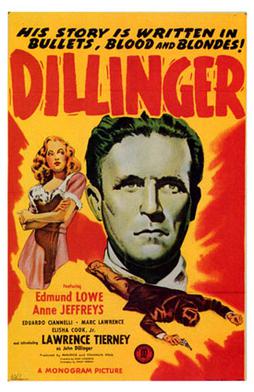
Dillinger is a 1945 gangster film telling the story of John Dillinger.

Crime Wave is a 1954 American film noir starring Sterling Hayden and Gene Nelson, and directed by Andre de Toth. It was adapted from a short story which originally appeared in The Saturday Evening Post - "Criminal Mark" by John and Ward Hawkins.

Robbery is a 1967 British crime film directed by Peter Yates and starring Stanley Baker, Joanna Pettet and James Booth. The story is a heavily fictionalised version of the 1963 Great Train Robbery. The film was produced by Stanley Baker and Michael Deeley, for Baker's company Oakhurst Productions.
The West End Gang is a Canadian organized crime group in Montreal, Quebec. An Irish mob group originating from the Irish-Canadian ethnic enclave of Pointe-Saint-Charles in the 1950s, the majority of the gang's earnings were initially derived from truck hijackings, home invasions, kidnapping, protection rackets, extortion, and armed robbery, with its criminal activities focused on, but not restricted to, the west side of Montreal. The West End Gang came to prominence via a series of high-profile bank robberies between the 1950s and the 1970s, a period when Montreal was known as "Bank Robbery capital of North America". Due to the gang's control of illegal activity at the Port of Montreal, it moved into drug trafficking and became one of the most influential criminal organizations in Canada.

The 2006 Securitas depot robbery in Tonbridge, England, was the UK's largest cash heist. It began with a kidnapping on the evening of 21 February 2006 and ended in the early hours of 22 February, when seven criminals stole almost £53 million. The gang left behind another £154 million because they did not have the means to transport it.

The Great Riviera Bank Robbery, also known as Dirty Money and Sewers of Gold, is a 1979 British heist film written and directed by Francis Megahy and starring Ian McShane, Warren Clarke, Stephen Greif and Christopher Malcolm. In the film, based on a bank robbery masterminded by Albert Spaggiari in 1976, members of a neo-fascist group team up with professional criminals to rob the safe deposit vault of a bank in a French resort town.
William Daddano Sr., also known as "William Russo" and "Willie Potatoes," was a top enforcer and loan shark for the Chicago Outfit and a participant in some high-profile robberies.
$17.3 million in cash was robbed from the Charlotte, North Carolina, regional office vault of Loomis, Fargo & Co. on the evening of October 4, 1997. The robbery was committed by Loomis vault supervisor David Scott Ghantt, his married girlfriend Kelly Campbell, Steven Eugene Chambers, his wife Michelle Chambers, Michael Gobbies, and four other co-conspirators. An FBI criminal investigation ultimately resulted in the arrest and conviction of eight people directly involved in the heist, as well as sixteen others who had indirectly helped them, and the recovery of approximately 88% of the stolen money.
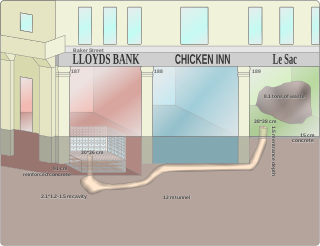
The Baker Street robbery was the burglary of safety deposit boxes at the Baker Street branch of Lloyds Bank in London, on the night of 11 September 1971. A gang tunnelled 40 feet (12 m) from a rented shop two doors away to come up through the floor of the vault. The value of the property stolen is unknown, but is likely to have been between £1.25 million and £3 million; only £231,000 was recovered by the police.

Payroll is a 1961 British neo-noir crime thriller film directed by Sidney Hayers and starring Michael Craig, Françoise Prévost, and Billie Whitelaw. The screenplay, written by George Baxt was adapted from Derek Bickerton's 1959 novel of the same name. The film revolves around a group of criminals who plan and execute a wages robbery, which ultimately ends in disaster.
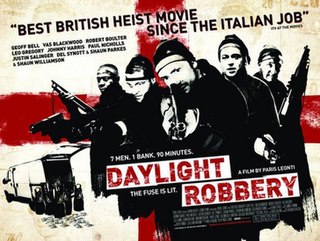
Daylight Robbery is a 2008 British crime film, directed by Paris Leonti and starring Paul Nicholls and Geoff Bell.
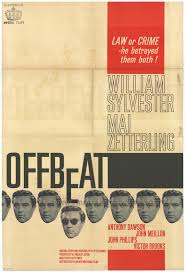
Offbeat is a 1961 black-and-white British crime film directed by Cliff Owen and starring William Sylvester, Mai Zetterling, John Meillon and Anthony Dawson. An MI5 officer goes undercover to catch a criminal gang.

James "Old Jimmy" Hope was a 19th-century American burglar, bank robber and underworld figure in Philadelphia and later New York City. He was considered one of the most successful and sought after bank burglars in the United States during his lifetime as well as a skilled escape artist for his repeated breakouts from Auburn State Prison in New York.

Radio Cab Murder is a 1954 British second feature crime film directed by Vernon Sewell and starring Jimmy Hanley, Lana Morris and Sonia Holm. It was made by the independent Eros Films.















